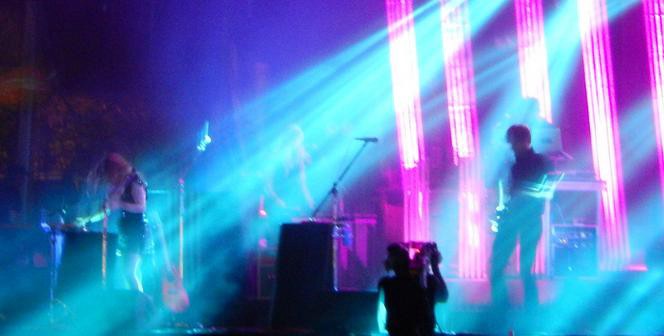A Love Letter to the Postal Service


All my life I’ve been a fan of temporality; everything is better when you know it will never happen exactly the same way again. But last weekend I saw the Postal Service play their penultimate set at Lollapalooza and since then I’ve been hit with thoughts that are both new and unwelcome, like “Take me back” and “I would do anything except kill a person to go back” and “Why am I crying into this sandwich?”
This is only partially based on the music. I am not claiming that Give Up, with its often-clumsy lyrics and constant reach for poignancy, is the greatest album of all time. I am also not claiming that I didn’t spend the entire set with my heartstrings shredding into technicolor, my great teenage musical cathexis alive again and punting me straight in the — bursts into tears for fourth time today.
I’m not embarrassed about it. There was nothing else like Postal Service before Postal Service, and for every Owl City they’ve created there are another dozen legitimate heavy hitters in their wake. Give Up was post-9/11 hurt and optimism encapsulated at a vital musical tipping point between analog (Gibbard sending his toplines via snail mail) and digital (Tamborello piecing the album together on his laptop) — an album as Zeitgeist-y as it was durable. Its influence is all over the bleeps and beats of today’s scene, and at their best the Postal Service mounted a staggering chemistry, something that was intimate and oceanic at once, exploding the personal into a universal in a way that is difficult to manage in any type of art.
But that sound was only new in 2003, and the Postal Service reunion tour had nostalgia as its lifeblood from the beginning. It’s less about the music itself than what the music evokes; probably it always is, maybe nostalgia is the root of music’s basic proposition. During the Renaissance, a type of herding song called Kuhreihen was banned among Swiss mercenaries fighting abroad because of how quickly it led to mal du Suisse, the original nostalgia. Today we choose our summer hits based on how strong we imagine their retroactive pull to be, and as the years roll on, it’s as Chumbawumba once noted: we sing the songs that remind us of the good times, we sing the songs that remind us of the best times.
What does it mean to feel such intense nostalgia for an album that came out just a decade ago? I am not normally a customer at this store. I’ve always been suspicious of Youth Reminiscence — “In my day, little brother, we had dial-up Internet instead of this Comcast high-speed bundle” — and am averse to the idea that any change I’m old enough to witness could be meaningful at all. “Dating was so different before social media,” I imagine a 29-year-old saying to her 16-year-old cousin over coffee, and then I think about how I see my mom so infrequently and when I do she’s always like I miss you and I’m like But I’m right here in the passenger seat of your car, or how there were 120 million people alive in Europe in the 11th century alone and I’ll never know what any of them thought about anything. There doesn’t seem to be much point in getting pulled backwards within lives that are already infinitesimal.
Nevertheless, here it is — my first big bout of nostalgia, or actually it’s probably closer to the saudade: the longing you feel for someone whose whereabouts are unknown, something unlikely to return. And that aspect — not the missing itself, but something missing, and permanently — is what makes this flare-up so different than ordinary past-fondness. With this I can understand why doctors used to diagnose nostalgia in the Civil War era, why they used to look for it in the bones.
And I think I’ve found it: what I’m missing is not a time but an emotional ability, because when you are a person who is much more comfortable with music-related feelings than any other kind, the bands you attach to become metonymous with parts of your heart. And for me, Postal Service represents enchantment detached from love or chemistry, the feeling of being enamored with the world without expecting anything from it. I didn’t realize how long I’d been without that, or how much I’d been missing it, or how much that for me was the defining experience of being a young person — those feelings had gone unarticulated until last Saturday night.
It’s strange to come full circle on something and realize that you’ve changed, and not for the better. That show was the end of an period that started when I couldn’t have imagined that beautiful things would ever scare me, when I couldn’t understand why people would ever shy away from love. Because back then I only knew it as music; I hadn’t learned what’s so dumbly obvious now, that love is much more complicated than the kind delivered through headphones rather than flesh, the kind that waits a decade for you until you’re ready to jump crying into its arms in the middle of Chicago under the city lights with forty thousand strangers who all came there to say I remember how good this was, and goodbye.
Previously: “A Night with Sugar Ray”
Photo credit swimfinfan/Flickr